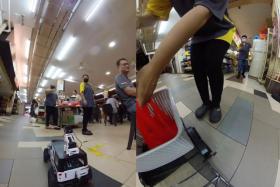F&B must tackle ‘fork to mouth’ step
Not enough attention is being paid to the final step of food safety, and technology may be the answer
Singapore has a trusted and well regulated food industry.
But even with high food safety standards, Singapore is not immune to cases of food poisoning from poor food and kitchenware handling.
Launched in April 2019, the Singapore Food Agency intends to improve food safety to ensure the highest quality of food.
With the statutory board's focus remaining on the "farm to fork" processes, there is an increasing trend of food businesses overlooking the "fork to mouth" process.
The hard truth
Food businesses strive to make sure their food is clean and safe - but can they say the same about their tableware and utensils?
Consumers will be disappointed to learn that cleaning utensils before eating does not actually reduce germs.
Therefore, this final point of contact from "fork to mouth" is equally important to ensure total food safety.
Proper sanitisation needs to be implemented, and using heat to do so is the most common method used in restaurants.
Managing food safety in the hospitality industry
Last year, the hygiene rating of a couple of hotels were downgraded due to food poisoning cases.
This has led to some of these hotels taking the next steps in the "fork to mouth" process by reinforcing stricter monitoring of overall kitchen sanitation, utensils and equipment.
However, it is not sufficient to put such a heavy reliance on human labour to achieve total food safety.
The emergence of technology makes it that much easier for hotels to free their resources to create quality food and services for their guests, while leaving food safety to the experts.
Promising food safety with innovation
With its Smart Nation initiative, Singapore is paving the way for digital transformation in elevating hygiene in food safety practices and protocols.
Machines can now monitor basic functions such as water levels, temperatures and detergent.
They also have sensors that provide digital readings on many different parameters.
Nevertheless, however great technology may be, the human touch is still necessary.
The data generated by these machines is only meaningful when interpreted and used for future implementation and improvements, by humans.
With the ongoing challenge of food safety in Singapore, food businesses need to shift their focus and resources to the final stretch from " fork to mouth".
It sounds daunting but it is imperative for businesses to have confidence in the power of technology.
Food businesses need to invest in technology, without neglecting the human element, to equip themselves with tools to solve local and global problems much larger than food hygiene. Make the smart move and think long-term.
The writer is vice-president and general manager of Ecolab, Institutional Division, Asia-Pacific. Ecolab is the global leader in water, hygiene and energy technologies and services and helps businesses in the food service, food processing, and hospitality sectors.
Get The New Paper on your phone with the free TNP app. Download from the Apple App Store or Google Play Store now


